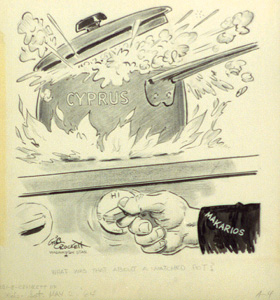End of Empire - British Attempts at Controlling Cypriot Sovereignty, 1945-1974
Home | Timeline | Maps | People | Groups | Countries | Non-human actors | Bibliography

Independence was granted to the Republic of Cyprus in August 1960, more than five years after the outbreak of a guerilla revolt against the British, who had governed the island for the previous eighty-two years. Independence, however, came not as the realization of a cherished goal but as a compromise settlement arranged over the heads of the Cypriots by Greece and Turkey, in conjunction with Britain. Greek Cypriots, who comprised about four-fifths of the colony's 600,000 inhabitants in 1960, had aspired to union with Greece, whereas Turkish Cypriots, a minority making up most of the rest of the island's inhabitants, had advocated partition of the island as the only acceptable alternative to continued British rule.1
1. Frederica M Bunge, ed., Cyprus: A Country Study (Washington, D.C.: The American University, 1980), xxi. Return to place
